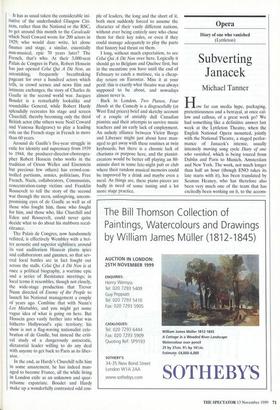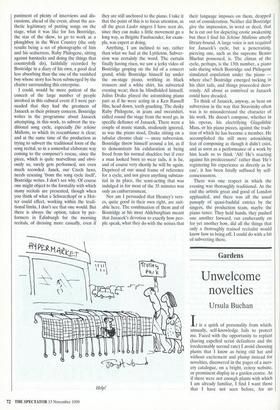Opera
Diary of one who vanished (Lyttleton)
Subverting Janacek
Michael Tanner
How far can media hype, packaging, pretentiousness and a betrayal, at once cal- low and callous, of a great work go? We had something like a definitive answer last week at the Lyttleton Theatre, when the English National Opera mounted, jointly with the National Theatre, a staged perfor- mance of Janacek's intense, usually intensely moving song cycle Diary of one who vanished, which is being toured from Dublin and Paris to Munich, Amsterdam and New York. The work, not much longer than half an hour (though ENO takes its late starts with it), has been translated by Seamus Heaney, who has therefore also been very much one of the team that has excitedly been working on it, to the accom-
paniment of plenty of interviews and dis- cussions, ahead of the event, about the aes- thetic legitimacy of putting songs on the stage, what it was like for Ian Bostridge, the star of the show, to go to work as a ploughboy in the West Country (the only results being a set of photographs of him and his seductress, Ruby Philogene, sitting against haystacks and doing the things that countryfolk do), faithfully recorded by Bostridge in a diary of his own, a good deal less absorbing than the one of the vanished boy whose story has been submerged by the chatter surrounding this enterprise.
I could, would be more patient of the conceit of the large number of people involved in this cultural event if I were per- suaded that they had the greatness of Janacek as their primary concern. Bostridge writes in the programme about Janacek attempting, in this work, to subvert the tra- ditional song cycle, especially Die schone MaHain, to which its resemblance is clear; and at the same time of the production as trying to subvert the traditional form of the song recital, so in a somewhat elaborate way coming to the composer's rescue, since the piece, which is quite marvellous and obvi- ously so, rarely gets performed, not even much recorded. Janek, our Czech hero, needs rescuing 'from the song cycle itself, Bostridge writes. I don't see why. Of course one might object to the formality with which many recitals are presented, though when you think of what a Schwarzkopf or a Hot- ter could effect, working within the tradi- tional limits, I don't see that one would. But there is always the option, taken by per- formers in Edinburgh for the morning recitals, of dressing more casually, even if they are still anchored to the piano. I take it that the point of this is to focus attention, as all the great Lieder singers I have seen do, since they can make a little movement go a long way, as Brigitte Fassbaender, for exam- ple, was expert at doing.
Anything, I am inclined to say, rather than what we had at the Lyttleton. Subver- sion was certainly the word. The curtain finally having risen, we saw a jerky video of Bostridge groping on the lid of a concert grand, while Bostridge himself lay under the on-stage piano, writhing in black trousers and a white shirt, his subverted evening wear; then he blindfolded himself. Julius Drake played the astonishing piano part as if he were acting in a Ken Russell film, head down, teeth gnashing. The dusky Ruby Philogene, in jeans and sweatshirt, sidled round the stage from the word go, in specific defiance of Janacek. There were a couple of music stands, studiously ignored, as was the piano stool, Drake sitting on a tubular chrome chair — more subversion. Bostridge threw himself around a lot, as if to demonstrate his exhilaration at being freed from his normal shackles; but if ever a man looked born to wear tails, it is he, and of course very shortly he will be again. Deprived of our usual frame of reference for a cycle, and not given anything substan- tial in its place, the semi-acting that was indulged in for most of the 35 minutes was only an embarrassment.
Nor am I persuaded that Heaney's vers- es, quite good in their own right, are suit- able here. The combination of them and of Bostridge at his most Aldeburghian meant that Janacek's devotion to exactly how peo- ple speak, what they do with the noises that Help!
their language imposes on them, dropped out of consideration. Neither did Bostridge give the impression, in word or deed, that he is cut out for depicting erotic awakening but then I find his Schonellerin utterly library-bound. A large voice is not required for Janacek's cycle, but a penetrating, piercing one, such as the supreme Benno Blachut possessed, is. The climax of the cycle, perhaps, is the 13th number, a piano solo during which Bostridge and Philogene simulated copulation under the piano where else? Bostridge emerged tucking in his shirt tails, and things proceeded deco- rously. All about as contrived as Janacek could have dreaded.
To think of Janacek, anyway, as bent on subversion in the way that Stravinsky often was is to misunderstand the character of his work. He doesn't compose, whether in his operas, his electrifying Glagolithic Mass, or his piano pieces, against the tradi- tion of which he has become a member. He accomplished the still more astonishing feat of composing as though it didn't exist, and as soon as a performance of a work by him leads us to think 'Ah! He's reacting against his predecessors!' rather than 'He's registering his experience as directly as he can', it has been fatally suffused by self- consciousness.
There was one respect in which the evening was thoroughly traditional. At the end the artistic great and good of London applauded, and there was all the usual panoply of quasi-bashful entries by the singers, the production team, maybe the piano tuner. They held hands, they pushed one another forward, ran exuberantly on for yet another bow, did all the things that only a thoroughly trained recitalist would know how to bring off. I could do with a bit of subverting there.



























































































 Previous page
Previous page